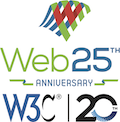Important Dates
Registration is closed
You may request to put on the waiting list.
3 February 2014:
Deadline for Position Papers/Statements of Interest
10 February 2014:
Acceptance notification and registration instructions sent
26 February 2013:
Program and Position Papers announced
28 February 2014:
Deadline for registration
(invitation required, no participation fee)
12 March 2014, 9 AM
Workshop begins
13 March 2014, 5 PM
Workshop ends
Host
W3C gratefully acknowledges IRT (Institut für Rundfunktechnik) for hosting this workshop.

Sponsor

If you're interested in being a sponsor, please contact J. Alan Bird at abird@w3.org or +1 617 253 7823. For additional information, please visit the Sponsorship program.
Partners

The workshop has received funding from the European Community's Seventh Framework Programme (FP7/2007-2013) under grant agreement n°610404 (MediaScape).
Objectives
With HTML5 well on its way to standardization in 2014, and a new effort on HTML 5.1 recently launched, it is time to have fresh look at the current state of the art in order to identify remaining roadblocks for the use of Web technology in broadcasting and the TV industry, including new developments such as:
- Hybrid TV
- Second- and multiple screen scenarios
- Social television
Since 2010, W3C has been actively involved in the Web and television area, and has worked successfully with the TV community to identify a first set of new requirements for the open Web platform in general and HTML5 in particular resulting from the use of Web technology in the TV field. These requirements have been incorporated into W3C standards and are becoming widely available in browsers and other user agents.
Building on these successes, the goal of this workshop is to plan future work by assembling key players from TV and the Web industry to discuss the important questions of Web and TV convergence, and how standardization can help across the globe.
We invite you to Munich to influence and shape the next generation of TV and broadcasting content. Discussion may lead to chartering of new standardization work, development of best practices, technologies and/or vocabularies.
Workshop topics
Possible topics for the workshop include, but are not limited to the following:
Hybrid TV
- Next-generation broadcasting: HTML5-based hybrid TV
- Migration from CE-HTML to HTML5 in OIPF/HbbTV
- Potential gaps in HTML5 for use in hybrid TV and how to close them
Second/Multiple Screens
- Multiscreen control/data sharing
- Authoring web content for multiple devices
- Enabling multi-screen advertising
- Using the Open Web Platform for multiscreen: Implementation experiences
Standardisation Needs
- Standardization of advanced metadata, e.g. for (object) audio or in-band tracks
- Evolution of timed text to cope with technological developments, e.g. 3D and 4K+ screens
Hot Topics
- Building TV apps with Web technologies
- Integration of TV and social networks
- Moving to HTML from other technologies (Java, MHEG, Ginga)
- Testing: Discussing priorities for coverage of test suites
- Multiple streams: Improving support for stream splicing, synchronisation, etc.
- Further enhancement of Media Source Extensions
- Harmonization and shared understanding of TV-related standards and the Open Web Platform
Who Should Attend
W3C invites up to two attendees per company:
- Broadcast and media companies
- Browser and software vendors (including embedded browsers)
- Cable operators
- Consumer electronics manufacturers
- Content developers, aggregators and delivery providers
- Device manufacturers
- IPTV providers
- Multiple-system operators (MSOs)
- Network providers and telecommunications companies, especially video service divisions of those companies
- Standardization organizations related to Web & TV
- Television operators (broadcast, cable, satellite)
- VOD operators
To ensure productive discussions, the Workshop will include sessions which are primarily technical, but grounded in business needs.
The sessions will be conducted in English; we will do our best to accommodate special needs, but signing and continuous translation will not be available.
Please note that public registration is closed.

